State Dairy Farms Losing Immigrant Workers
51% of workers are immigrants. Trump’s policies threaten needed workers.
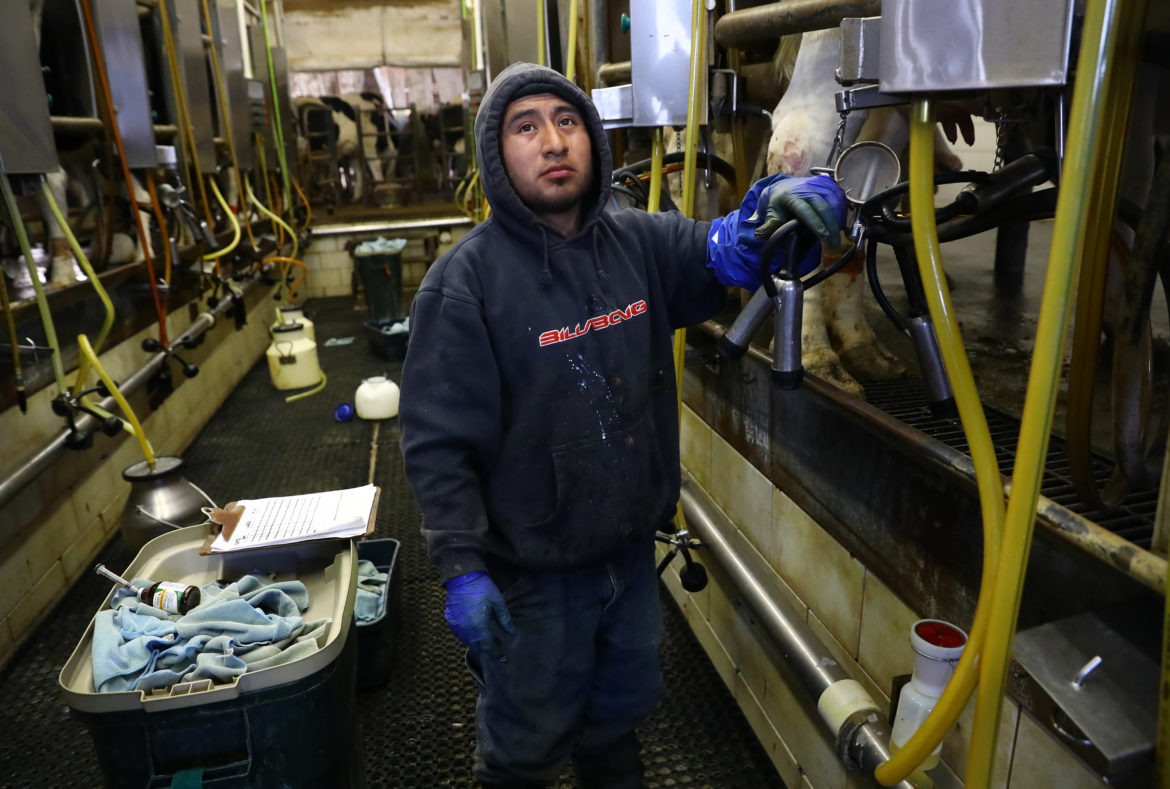
Armando, a Mexican employee at Rosenholm Farm in Cochrane, Wis, works in the milking parlor. He asked that his last name not be used because of his immigration status. Armando is among the estimated 51 percent of all dairy workers nationwide who are immigrants. His boss, John Rosenow, says that if his foreign-born employees were deported, or decided to look for work elsewhere, Americans would lose their jobs too, because the farm would be forced to shut down. Photo by Coburn Dukehart of the Wisconsin Center for Investigative Journalism.
Twenty-six-year-old Rosa Jiménez and her husband, Manuel, 36, used to do the grocery shopping together. They would take the kids and make a day of it. But, lately, Manuel goes alone.“Imagine if they (immigration authorities) picked us up there. I won’t take the risk of them taking my children,” Jiménez says, bursting into tears as she sits in her kitchen on a recent afternoon.

“Rosa” hugs her 3-year-old son at their home on a dairy farm in Pepin County, Wis. Her husband, “Manuel” is a laborer on the farm. She says her family has experienced racial slurs since President Donald Trump took office. Photo by Coburn Dukehart of the Wisconsin Center for Investigative Journalism.
The couple always planned on one day returning to Mexico when they came to the United States to find work on farms; she arrived 10 years ago, he has been here for 15. But negative depictions of immigrants by the president and the open hostility the family has experienced since the election accelerated those plans.
Now living with their two young children on a Pepin County dairy farm in northwestern Wisconsin where Manuel works, the couple — who asked that their real names not be used because of their immigration status — are making plans to leave their life in America’s Dairyland and go back across the border, much sooner than they had expected.
They are among the estimated 51 percent of all dairy workers in the United States who are immigrants. A significant portion — more than three-fourths of the workers at some dairy farms according to workers, farmers and industry experts — are undocumented after entering the country illegally or overstaying visas.
Like the Jiménez family, some now live in fear of deportation because of vows by President Donald Trump — who in November used a strong showing in rural areas to become the first Republican presidential candidate to carry Wisconsin since 1984 — to crack down on undocumented immigrants. It’s unclear how many immigrants working on dairy farms in Wisconsin are here illegally.
Dairy producers in Wisconsin increasingly struggle to recruit and maintain the immigrant workforce on which the state’s $43 billion-a-year dairy industry relies, Wisconsin Public Radio and Wisconsin Center for Investigative Journalism found in interviews this month with farmers, workers and industry experts.

“Rosa” hugs her 3-year-old son at their home on a dairy farm in Pepin County, Wis. Her husband, “Manuel” is a laborer on the farm. She says her family has experienced racial slurs since President Donald Trump took office. Photo by Coburn Dukehart of the Wisconsin Center for Investigative Journalism.
Farmers say deporting immigrants working here illegally could harm Wisconsin’s signature industry, which ranks second in the nation for milk production and first for cheese. Milking cows can be a dirty, physically demanding job that includes long, irregular work hours; farmers say few Americans are willing to do it.
Buffalo County dairy farmer Nora Gilles says her farm is 100 percent reliant on immigrants. Losing them would be her “worst nightmare,” she says.
“We definitely wouldn’t be able to farm. I mean you just couldn’t do it without them. Because you can’t get anybody else that wants to work,” says Gilles, whose farm has about 1,000 head of cattle.
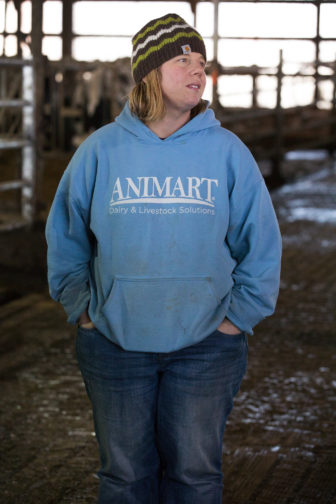
Nora Gilles’ family owns a large dairy farm in northern Buffalo County, Wis. She says her farm is almost completely reliant on immigrant labor. Photo by Coburn Dukehart of the Wisconsin Center for Investigative Journalism.
John Holevoet, director of government affairs for the Dairy Business Association, which represents dairy farmers and milk processors, says the supply of immigrant workers has been tight for several years.
“Anxiety and people’s desire maybe to return home or leave the state or whatever else, well, that doesn’t help when you’re already facing what would be an already challenging labor market to begin with,” he says.
But it has become even more challenging since the election, University of Wisconsin-Extension agent Jennifer Blazek says.
“The agriculture labor market tended to be more fluid and flexible and I think recent political events have restricted that fluidity because of the fear it’s caused,” says Blazek, who is a dairy and livestock agent for Dane County.
Blazek says that immigrants “are not moving to different parts of the country, following jobs as they used to. It’s risky to move, especially to places you aren’t familiar with…plus you have the added risk of being ‘visible’ because immigrants often look different than established residents and ‘stick out.’ “
She adds: “Some immigrants have expressed a desire to move back to Mexico, if they have that ability, to leave the current negative climate surrounding immigration and immigrants.”
Gilles and her brothers, co-owners of the farm, have had to raise pay in recent years by several dollars to a starting wage of about $10.50 an hour just to keep immigrant workers from leaving for higher pay at another farm. Pay has gone up over a dollar just in the past few months.
Meanwhile, the flow of workers has slowed. The number of immigrants entering the United States from Mexico has been in a slump since the recession.
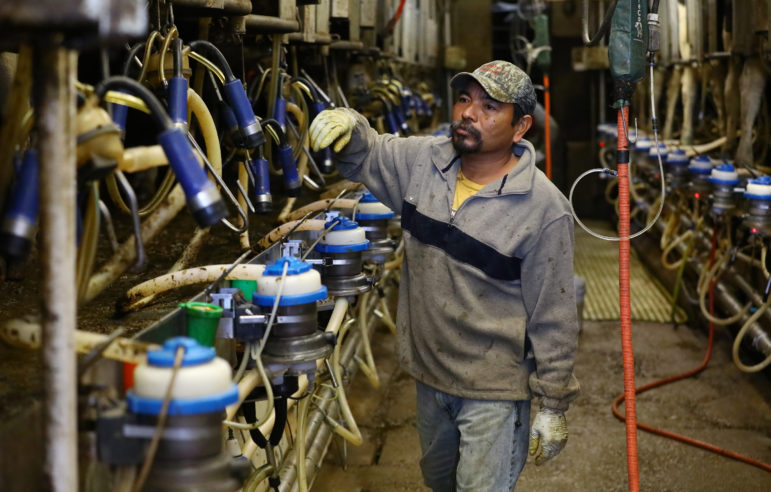
Jorge, who recently arrived from Mexico, works in the milking parlor of Nora Gilles’ dairy farm in northern Buffalo County, Wis. Photo by Coburn Dukehart of the Wisconsin Center for Investigative Journalism.
In fact, in 2015, more people returned to Mexico than came into the United States, according to the Pew Research Center, which tracks Hispanic trends in America.
U.S. Customs and Border Protection reported that the number of people caught illegally attempting to cross the U.S.-Mexico border was down 40 percent from January to February, a period when apprehensions normally increase by 10 to 20 percent.
Adding to foreign workers’ uncertainty is ramped-up immigration enforcement like the 287(g) program, which enables local police to act as immigration enforcement; and broadening the scope of priorities for agencies like Immigration and Customs Enforcement (ICE) to include immigrants charged with low-level offenses. Plans to build a wall on the southern U.S. border have created additional anxiety.
Gilles says immigrant dairy workers used to show up every week at her farm looking for work. But not anymore.
“I think we’ve been short two or three people for like a year. Constantly, we’re just always short,” she says. “They’re not coming here like they were.”
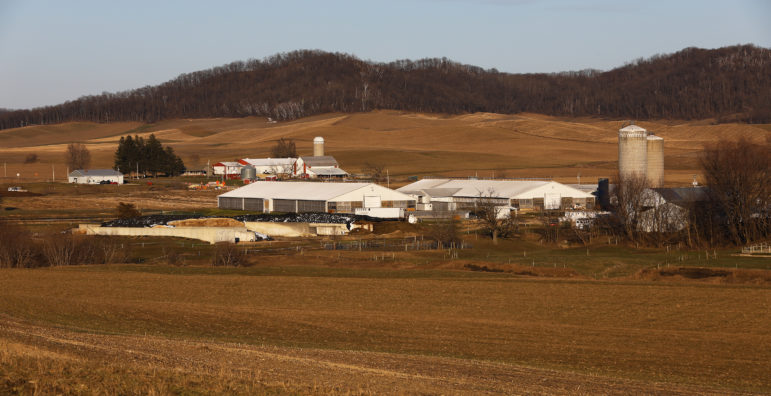
The Rosenholm Farm in Cochrane, Wis. relies on immigrant labor. The owner, John Rosenow, says moves to deport undocumented workers would be devastating to his business and the state’s $43 billion-a-year dairy industry. Photo by Coburn Dukehart of the Wisconsin Center for Investigative Journalism.
The decreasing number of immigrants means farmers like Gilles have to work harder to attract them and keep them from leaving for better paying jobs at nearby farms.
“Just in the last year, turnover’s been crazy, just crazy. And I think that’s everywhere, I don’t think it’s just here,” she says. “Everybody that I know is emailing or calling, ‘Do you have anybody extra?’ I don’t know if it’s out of fear, or if it’s just that there’s less coming… I mean they’ll drop you and go somewhere else for a little bit more money.”
Jiménez says workers understand their value to the industry.
“Yes we need the work, but the farmers also need us because there are farms where 20, 25 or 30 people work, and nobody has papers,” she says. “Imagine if they got rid of all of them, if they did a raid and took everybody. What are the farmers going to do? The cows will die.”
Workers face ‘ugly’ remarks
Jiménez says she has also noticed a change in the way her family is treated in the community.
“There have always been racist people. That’s nothing new. They’ve always been there. But it’s like now people feel more free to be offensive or do things that aren’t right,” Jiménez says.
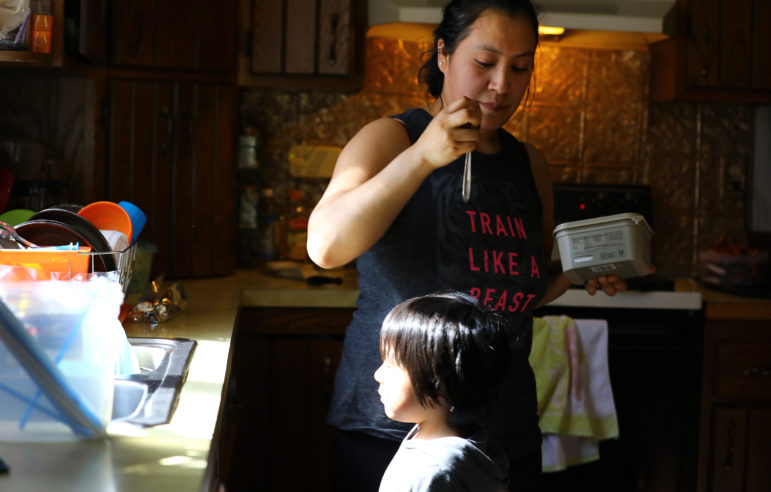
“Rosa” makes food for her 3-year-old son at their home on a dairy farm in Pepin County, Wis. She says she has noticed a change in the way her family is treated in the community since Donald Trump’s election. Photo by Coburn Dukehart of the Wisconsin Center for Investigative Journalism.
In a recent incident, Manuel was filling up his tank at a gas station when a group of men dressed in hunting gear stopped to insult him. His wife declined to repeat the remarks, which she described as “ugly.”
“Can you imagine what could happen to us? I’m scared that we’ll go out to eat somewhere and a crazy person will show up and shoot us or something like that because it can happen. Because people who are racist go to the extreme,” Jiménez says.
Recently, when President Trump addressed members of Congress, Jiménez watched as he acknowledged the father of a high school boy shot dead by a Latino undocumented gang member in California. She objected to the implication that immigrants are criminals.
“We just want them to let us work in peace, and to not be treated like criminals or terrorists because we’re not,” she says. “We aren’t rapists either. We are just people who want to work.”
As farms grow, need for immigrants increases
On a recent morning, Guillermo Ramos is in the barn of Gilles’ farm, where he has worked for 17 years. The air smells of feed and manure. Walking between two rows of cows that poke their heads out of metal headlocks to chew feed, he surveys the animals and the tags pinned to each of their ears, searching for a number that corresponds to the one on his clipboard.
Finally, he sees what he’s looking for. Taking a syringe filled with Salmonella vaccine, Ramos steps forward into a mound of hay and plunges it into the cow’s thigh.
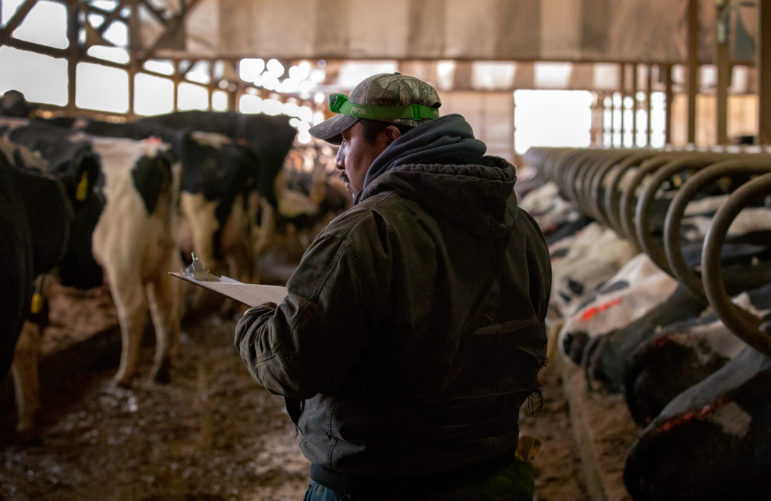
Guillermo Ramos vaccinates dairy cows in the freestall barn of a dairy in northern Buffalo County, Wis. The 40-year-old, Mexican-born farm manager has worked on the farm for almost 20 years. His boss, Nora Gilles, says he is integral to the operation of the dairy. Photo by Coburn Dukehart of the Wisconsin Center for Investigative Journalism.
The 40-year-old, Mexican-born farm manager started off here as a milker before working his way up to inseminating cows, administering medications and trimming hooves. Like many other workers on dairy farms in Wisconsin, Ramos entered the United States illegally.
After crossing the U.S.-Mexico border in 1999, he eventually traveled to Wisconsin where he heard dairy farms were in need of help. That need continues to grow, Ramos says.
“When I got here, I saw a farm that had 275 cows. Now they have 1,500. How many Mexicans, how many ‘illegals,’ work there? Around 15. When we started it was just two Mexicans. That’s how the farm started. I’ve seen these farms grow with illegal labor. Although many people don’t like it, or they don’t want to accept it, it’s the truth.”
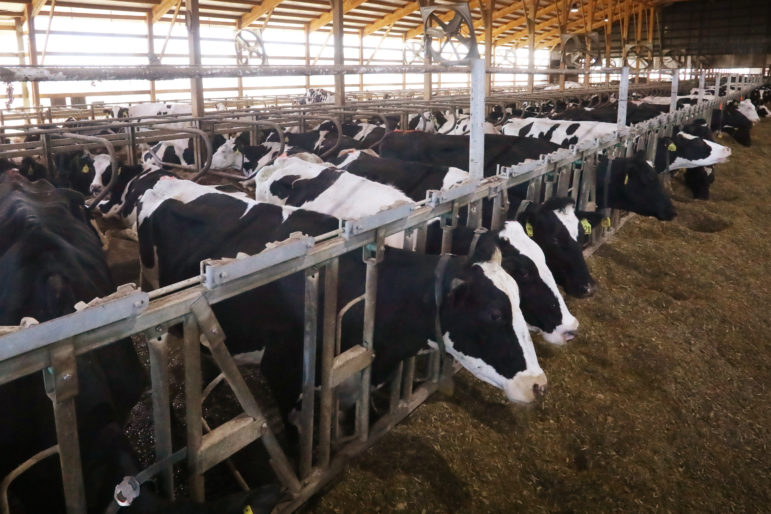
Dairy cows are seen in a freestall barn in northern Buffalo County, Wis. The size of Wisconsin farms has increased in recent years, and farmers say tougher immigration policies are making it difficult to find and keep workers. Photo by Coburn Dukehart of the Wisconsin Center for Investigative Journalism.
Statistics show the size of Wisconsin farms has grown rapidly in recent years. In 2003, there were about 16,000 farms. Today there are about 9,300. But the number of cows — about 1.3 million — remains roughly the same, which means farms are bigger and need a reliable workforce to run them.
But lately, Ramos has begun to question if he will be able to stay.
“Right now with the political situation, we’re scared. You can’t say, ‘Nothing’s going to happen!’ Because it happens. Even if you don’t want to accept it, it’s happening. We live in fear, especially those of us who have families.”
Regarding the rhetoric that immigrants are stealing jobs, Ramos says he and others like him are just doing work Americans don’t want to do.
“In 17 years, I have never seen a U.S.-born worker come here and say to my boss — ‘You know what? I’m looking for a job. I want to milk cows.’ In 17 years.”
Year-round work draws immigrants
For years, manual labor jobs in agriculture, construction and the service industry have drawn Mexican and Central American men and women to the United States. Many risk extortion, kidnapping and death crossing the U.S.-Mexico border for higher wages.
Dairy farms need a consistent year-round workforce to milk cows three times daily, seven days a week and often provide benefits such as paid vacation, housing and health insurance.
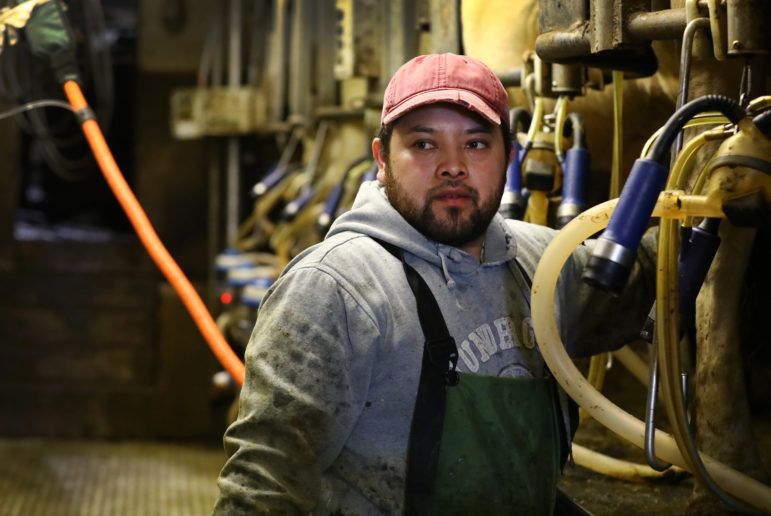
Jorge Hernandez works in the milking parlor of a dairy farm in northern Buffalo County, Wis. Photo by Coburn Dukehart of the Wisconsin Center for Investigative Journalism.
New employees in the United States are required to fill out an I-9 form and present documentation to verify their identity and authorization to work in the country, but as long as a new hire’s documents appear to be genuine, farmers are not required to further inspect their authenticity.
While farmers who grow seasonal crops such as blueberries and sweet potatoes can apply to bring workers from other countries temporarily under the H-2A visa program, there is no such program for year-round employment in agriculture, which makes it difficult for dairy employees to work and reside in the United States legally.
In a 2010 federal survey, 85 percent of Wisconsin farmers with herds of 500 or more cows said the United States should create a guest worker program for the dairy industry.
A national survey in 2014 of dairy farms conducted by Texas A&M University and commissioned by the National Milk Producers Federation predicted severe losses for the industry if the flow of immigrant workers were to completely halt.
According to researchers, eliminating immigrant labor in the dairy industry would reduce production by 23 percent or 48 billion pounds of milk. The number of farms, currently at around 58,000, would decrease by 7,011. Retail milk prices would increase by 90 percent, meaning a $3 gallon of milk would cost consumers nearly $6, according to the study.
Without immigrants, U.S. economic output would also decrease by $32 billion, eliminating 208,208 jobs in the dairy industry and other businesses that rely on it, researchers predicted.
Crackdowns could shut down farms
John Rosenow, a farmer in Buffalo County, confirms that if his foreign-born employees were deported, or decided to look for work elsewhere, Americans would lose their jobs too, because the farm would be forced to shut down.
“If ICE came in here and checked my employees and found that they were undocumented and those 10 people left, my next option of course is to close down … and try to find a market for my cows and sell out. And I wouldn’t be able to farm anymore and it would just about kill me. I have no choice. I mean the cows have to be milked. I know no other source of labor.”

John Rosenow, owner of Rosenholm Farm, in Cochrane, Wis., says an immigration raid could shut down his business. Photo by Coburn Dukehart of the Wisconsin Center for Investigative Journalism.
Rosenow says some dairy farmers in his part of the state are already talking about preemptively selling their cows while there is still a market for them.
“Before the election, there was a lot of discussion. Everybody was concerned about immigration reform, but most of the farmers that I talked to (said) ‘I can’t vote for Hillary (Clinton), I just can’t.’ … Now that Trump’s elected, they say that they have hope and that he didn’t really mean what he said. And so we’ll see.”
Amy, a dairy farmer in Clark County, says 80 percent of her workers are immigrants; she voted for Trump despite his stance on immigration. She feared Clinton would have implemented heavy regulations and high taxes that could put her farm out of business. Amy asked that her last name not be used because she feared her business could be targeted by immigration officials.
“I have to hope … that they’re going to look at all sides and come to a compromise because I believe that Donald Trump is a businessman and he’s not dumb,” she says. “He knows how much immigrant labor there is in our country and what it (mass deportation) would do to our country.”
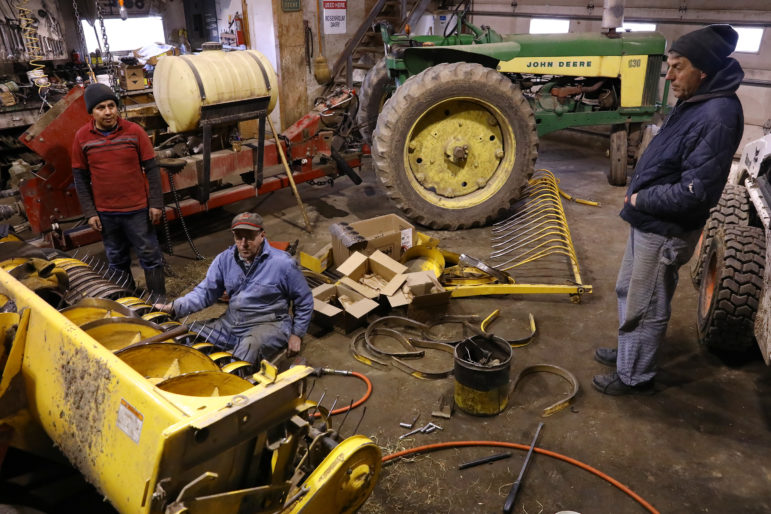
Roberto, left, a Mexican immigrant employeed at Rosenholm farm in Cochrane, Wis., works in the machine shop with Gerald Thaldorf, center, while talking to owner John Rosenow. Rosenow says the dairy industry in Wisconsin would be crippled without immigrant workers. Photo by Coburn Dukehart of the Wisconsin Center for Investigative Journalism.
Tim O’Harrow, a dairy farmer in Oconto Falls, says the biggest issue he worries about every day is having enough people to milk his 1,500 cows.
“This will put us out of business if we keep going down the road we’re going. I’ll lose everything I’ve worked for for 45 years,” O’Harrow says. “The reality is, we don’t have a backup plan.
“This country cannot produce enough food to feed its own people without foreign labor,” he adds. “It isn’t just dairy. It’s workers in slaughterhouses, it’s workers picking fruit. It’s all aspects of food is being supplemented by foreign labor. Because American citizens will not, will not do the work. It isn’t a matter of how much money. It’s a matter of they will not do it.”
This story is part of Wisconsin Public Radio’s State of Change: Water, Food And The Future Of Wisconsin project. It was jointly produced by WPR and the Wisconsin Center for Investigative Journalism. The nonprofit Center (www.WisconsinWatch.org) collaborates with WPR, other news media and the UW-Madison School of Journalism and Mass Communication. All works created, published, posted or disseminated by the Center do not necessarily reflect the views or opinions of UW-Madison or any of its affiliates.
-
Wisconsin’s Medicaid Postpartum Protection Lags Most States
 Feb 27th, 2024 by Rachel Hale
Feb 27th, 2024 by Rachel Hale
-
Wisconsin Has A “Smart Growth” Law To Encourage Housing, But No One Is Enforcing It
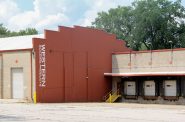 Dec 22nd, 2023 by Jonmaesha Beltran
Dec 22nd, 2023 by Jonmaesha Beltran
-
Milwaukee County Is Funding Affordable Housing In Suburbs
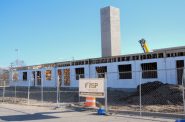 Dec 21st, 2023 by Jonmaesha Beltran
Dec 21st, 2023 by Jonmaesha Beltran



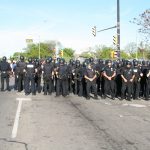
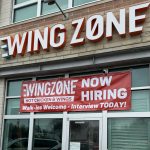






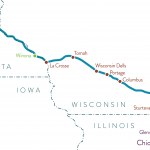





Middle America, you wanted it, you got it. Here is the intended outcome of the anitimagrant movement. All of those angry white men who resented the immigrants taking their jobs from them should be happy. They now have an opportunity to work at a dirty back breaking thankless job for less than a living wage. Walk don’t run to your nearest dairy farm. You don’t have to rush the lines will not be long.
So to recap:
Finally immigration laws are being enforced and it’s working.
Unemployed Americans are lazy, proof being that they won’t do “hard, dirty” jobs.
The Dairy industry doesn’t pay living wages. (where’s fight for 15?)
Following Marc Levine’s view of skilled labor, there’s no shortage of workers, there’s a pay gap in the Dairy industry.
The immigration enforcement has had a positive impact on wages.
Illegal immigrants help support factory farming.
There’s value in migrant worker programs, but dairy farms don’t quality as that type of work.
Things not in this story:
That only 25-75% of workers pay taxes, and often even when they do it is less than they’d pay if they were part of the system.
Despite what the story says, many do not receive benefits and are being taken advantage of by the farmers.
A way for longtime workers to become citizens is the best path forward, but you can’t do that if you can’t control the influx of new immigrants.
Don’t we have an unemployment issue in the inner city of Milwaukee?
Perhaps some of them could use a job….farming.
AG, you and I are on different sides of the political spectrum, but we had many of the same takeaways from this story.
$10.50/hour is pretty low pay for a hard, dirty job, located in a remote area. I tend to agree with the Marc Levine theory of economics. It seems to me that there IS a pay gap, contrary to last farmer quoted in the story. It sounds to me like the factory farms are making a lot of money off of the backs of undocumented immigrants.
I don’t agree with Trump’s policies, and I doubt that this administration will be working on any expanded migrant worker programs. So we’ll just have to get used to paying more for milk and cheese.
no where in your article do you use the word “illegal. All of us are descended from “immigrants” with the exception of native amaerican indians, however most came legally.
People who come illegally should not be surprised that there will be repurcussions. It is unfortunate and I feel for the workers and their employers. Their employers should have looked into making them legal when they hired them!
“most of the farmers that I talked to (said) ‘I can’t vote for Hillary (Clinton), I just can’t.’ …”
So you vote against your own best interest, and than cry that you may be forced to shut down and close shop?
Didn’t the mothers of these farmers ever tell them “You make your bed, you sleep in it” when they were growing up?
They are getting exactly what they ordered and now they’ve got to eat it. Bob Appetit!
Tucker there were hardly any immigration laws or regulation/enforcement until the 1920s. When that changed during the mid-1920s there were more than a million immigrants living here illegally. Many of our ancestors would not have qualified under today’s immigration laws.
Milk is being over produced ! Millions of gallons of milk were dump last year !Gov bought cheese to help bring up the price of milk!Illegal immigrants enable farms to to grow to big to fast! United States has lost hundreds of thousand if small dairy farms because they can’t compete with the large farms using illegal labor!
“$10.50/hour is pretty low pay for a hard, dirty job, located in a remote area. It sounds to me like the factory farms are making a lot of money off of the backs of undocumented immigrants.”
Yes, $10.50 isn’t a lot of money for the hard work involved in farming. But as the labor shortage continues…if economics theory is correct…wages should rise. But the fact that these are remote areas often indicates the cost of living is lower than in many urban areas.
But with 1,000 to 1,500 cows, these are the current model of family farms, not factory farms. And I doubt they are making lots of money. Farming has never been that lucrative and we will never be able to go back to the farms of the 1950/60s where you could bet by milking 100 to 150 head.
I definitely don’t agree with Trump’s “wall building” and deportation rhetoric, but he is just pandering to get a vote. But I also don’t agree with a system that allows foreign workers to do a job 10+ years without a path, and an obligation, to become a US citizen. I am sure this system was arranged so that business could exploit labor to it’s advantage, since workers can’t organize and fight back under this arrangement. So Republicans (and Corporate Democrats) probably won’t move to disrupt this business model that has helped to destroy unions in this country. We will just continue to get a bunch of useless blather and perhaps an idiotic wall (that some corporate interest will profit off).
Aren’t farm workers – legal or not – considered a different ‘class’ of workers? Missing a lot of job protections? I know that’s how it used to be, and if it still is, maybe there’s a reason why Americans don’t ‘want’ the jobs. If I or my kid could get killed on the job and it’s considered just part of the cost of doing business, I’m not going anywhere near it or allowing my kid to work it as a summer job or afterschool job.
Good discussion here. I think there is a lot regarding immigration that people of all political persuasions can agree on… we just get mired in the extreme rhetoric that the political parties and the media continually put out there.
Although Sue, I’m very disappointed in your perspective. Why is it ok for foreign or illegal workers to do it, but not you or your children? Your perspective on the jobs is off, but your attitude that immigrants are here just to do our dirty work is disappointing.
AG not every issue is distorted or tainted by overheated, divisive rhetoric from both sides of the spectrum. Many on the right have demonized immigrants and engaged in fear-mongering of which there is no equivalent on the left.
Whoa, AG, I can see how I could have come off sounding like that – my apologies. I was making the point that the talk about Americans being ‘unwilling’ to do labor like this has to be tempered with the facts about why.
I don’t make the rules that allow industries to establish classes of workers who have fewer protections than others but hearing the farm owners emphasizing that they just can’t get Americans to work – like we turn up our noses at getting dirty – irritates me. No one, immigrants legal or illegal included, should be expected to put themselves in dangerous situations for any amount of money. I’m sorry it’s happening and sorry we can expect more now that OSHA is in the crosshairs.
Vincent, not every issue is… but this one certainly is. If you listen to the loudest voices on the left, they’d have you think that the right wants to stop ALL immigration. That’s ridiculous and just a scare tactic. Most people who are “anti-immigration” are actually anti-ILLEGAL immigration. Even of those, the polls show most people (even conservatives) are pragmatic enough to recognize you can’t kick out 14 million illegals.
Anyone who says something along the lines of “this country was built by immigrants” or “So and so famous person in history was an immigrant” or anything of that nature, using it as an argument against illegal immigration, falls into this category.
Wrong, as per usual. What’s the liberal equivalent of Trump saying that half of illegal immigrants are criminals and that they are pouring into American and destroying the fabric of the country? Or virtually anything Steve King has said about immigrants? Saying the right wants to stop ALL immigration is not nearly as divisive and deplorable as the hateful comments of our president and elected officials. Claiming those are the same is lunacy.
“If you listen to the loudest voices on the left, they’d have you think that the right wants to stop ALL immigration.”
Rather, the greater concern on the left is that, time and time again, the right cannot seem to untangle blatantly racist and xenophobic attitudes from their opinions on immigration. Obviously, Trump has been of no help there. There’s a whole lot of middle ground that could be met upon in regards to immigration policy. The right has to come a long way to quell their worst elements on this issue if a rational discussion is to be had on this topic.
Vincent, I don’t like Trump and I did not vote for him, so I feel no obligation to ever defend his statements. However, your attributing a made up statement to him, or repeating false quotes, only proves the point I made in my last comment.
Daddy2girls does the same, as he is stuck complaining about perceived racism and xenophobia rather than explaining how deporting immigrants who committed crimes and securing our borders is an extreme position.
It would be interesting to find out why AG demands I defend a position I do not hold and did not express. Furthermore, the racism and xenophobia on the right is not merely my “perception”, but based in objective, observable fact – you know, that thing the right hates so much these days.
Reset the labor market for dairy workers. Maybe the true cost of milk has always been $7 a gallon. Reset transportation so that those who drive their vehicles on the road bear the actual cost of that benefit. Reset food prices, scrap the last farm bill and all subsidies. Reset healthcare. Reset and rightsize our infrastructure. Seems like as good a time as any.
Made up quotes? What are you talking about AG? Those are direct, on the record quotes from interviews with Trump. I found them in two seconds.
Trump on The Steve Deace Show: “People are flowing into this country by the millions, not by the thousands, by the millions, and destroying the fabric of the country,” Trump warned.
At the Iowa Freedom Summit, while bashing Jeb Bush for saying illegal immigrants come here for love, Trump said “half are criminals.”
AG I eagerly await your apology.
Daddy2Girls, the stated GOP policy is to secure the borders and deport illegal immigrants with criminal convictions, then open a dialog about the illegal immigrants left to find a solution. You seem to be against that by your comments, since you vilify the GOP position and thus that policy. So yes, defend that.
Vincent, I’m not going to get into a debate about Trumps hyperbole. The only factual statements I found regarding numbers were when he told 60 minutes “two, maybe 3 million.” He later walked that back to a report estimating 1.9 million. That’s hardly half… I looked for statements actually saying half, even if it was hyperbole (which knowing Trump, probably was), and couldn’t find it.
Still, this is Trump who said that. Hardly a person who talks in specifics and accuracy. Even he doesn’t change the validity of deporting illegal aliens who have been convicted of crimes and the need to secure our borders. The rest is just a scare tactic to drum up opposition.
Many farmers admit they knowingly hire illegal immigrants…and by doing so they are engaged in breaking the law. It is illegal to hire an undocumented worker. It seems to me we need to go after employers who hire undocumented workers. We need to make ‘e-verify’ mandatory for employers and then fine the employers who don’t use e-verify…and if employers have multiple hires of undocumented, and did not use e-verify, jail time should be imposed.
AG, you must be accessing some alternate reality where someone with my handle is making such statements. Perhaps you should redirect your “debate” to that phantom Daddy2Girls only you, apparently, can perceive.
Otherwise, I see no need to continue debating with someone who makes up my positions as he sees fit.
Wisconsin farms have relied on Mexican labor for a long, long time. Back in the 1950s a kid could make a little spending money by being bused out to truck farms and picking beans. Sometimes we picked along side of the Mexican workers who came here every summer to harvest cucumbers for the pickle canning industry. We were paid 2 1/2 to 3 1/2 cents a pound for the beans we picked. I don’t know what the Mexicans were paid. The ones I tried talking to spoke no English but that didn’t bother me because I had a grandmother who didn’t either. She only spoke Polish.
Their were whole Mexican families working in the fields and they didn’t always have the best living conditions. At the end of the harvest season they were nowhere to be found. As a ten year old, I assumed they all went back to Mexico but they probably went somewhere else to continue harvesting work. In time child labor laws and improved harvesting machines Made most of those jobs disappear. Almost everyone I know who was raised on a farm say they never want to live or work on one again. So where are the worker to come from? As always, emigrants. Yankees sold their farms to the Irish, Irish to the German and Poles, and so on. (Were they all ‘legal” imagrants?) Someday there might be all Mexican farms, and who knows, someday they might be Syrian farms. (I just had a picture in my mind of old country churches being converted into country mosques.)
We all have to eat. Does it matter who does the work?
Sorry if I got a little carried away and off subject here.
Did someone here say criminals shouldn’t be deported? I know I never said that.
At that same summit, Trump bashed GOP frontrunner and former Florida governor Jeb Bush’s past comments that immigrants came to America illegally “as an act of love.” He said:
“Half of them are criminals; they’re coming for love?” https://www.washingtonpost.com/news/the-fix/wp/2015/07/01/here-are-12-other-times-donald-trump-vilified-illegal-immigrants-in-no-uncertain-terms/?utm_term=.2f6bb57c97e5
Again I await your apology for claiming I was making that up.
What is not understood about ILLEGAL? Many are waiting to enter our great country the right way and it is unfair to them.
Too many distortions in the market complicate things: welfare, food stamps, medicaid, making americans not want to work. There are lots of young families that want to start a small farm and get out of the city, but they can’t compete with these huge farms, and the government has too many laws restricting people from farming the old fashioned way. Around here we cant sell raw milk. If it was legal again, consumers would just need to heat it themselves at home if they dont want to risk it being raw.. Join the small farm movement and ask for reduction of these laws. Consumers should be allowed to buy raw milk if they want it. And yes, milk should cost more too.
Large dairys have taken away many jobs. Local Veterinarians, feed sales, Implement dealers. I know, have been in feed sales for 35 years. It’s sad to see these large dairys. They don’t help the local economy, they hurt it. Because of them we have lost the true family farms who supported there local businesses.